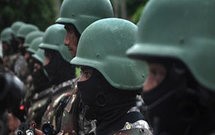 Indian media is touting the arrest of Gudsa Usendi, a spokesman for a regional committee of India's Maoist militant rebels known as Naxalites, as a significant victory for the country's counterterrorism efforts. Usendi, whose real name is Gumudavelli Venkatakrishna Prasad, served as the main media contact for the Dandakaranya Special Zone Committee's regional command structure. However, the surrender of a key figure within the country's Maoist insurgent movement is unlikely to be a blow to the Naxalites. As a regional-level public relations officer for the group, Prasad was probably not involved in operational details. Moreover, it takes more than the loss of one personality -- even a major figure -- to seriously degrade a militant network for any period of time.
Indian media is touting the arrest of Gudsa Usendi, a spokesman for a regional committee of India's Maoist militant rebels known as Naxalites, as a significant victory for the country's counterterrorism efforts. Usendi, whose real name is Gumudavelli Venkatakrishna Prasad, served as the main media contact for the Dandakaranya Special Zone Committee's regional command structure. However, the surrender of a key figure within the country's Maoist insurgent movement is unlikely to be a blow to the Naxalites. As a regional-level public relations officer for the group, Prasad was probably not involved in operational details. Moreover, it takes more than the loss of one personality -- even a major figure -- to seriously degrade a militant network for any period of time.
Prasad's true value will have to be determined in the weeks and months ahead, as Indian intelligence and security officials attempt to establish how much knowledge of Naxalite members (and operations in other, more critical regions) Prasad possessed. Should the defected media officer's surrender prove as significant a boon for New Delhi as Indian media is currently reporting, 2014 should see increased arrests, defections and raids against the Maoist organization's leadership and key positions, even as counterattacks erupt in much of southern and eastern India.
The 53-year-old (and reportedly ailing) Prasad surrendered to authorities in his native state of Andhra Pradesh on Jan. 9, along with his wife. Though Prasad -- whose alias, Guda Usendi, is a common nom de guerre for Naxalite media contacts -- operated chiefly in the state of Chhattisgarh, Andhra Pradesh's attractive clemency programs for Naxalites who surrender voluntarily helped encourage him to return home. Portions of both states are included in the broader insurgent region of Dandakaranya, a forest area situated between the borders of Andhra Pradesh, Chhattisgarh, Maharashtra and Odisha.
Indian media reported that Prasad was wanted for his involvement in the May 25, 2013, killing of 27 people, including Congress Party leaders V.C. Shukla and Mahendra Karma in Chhattisgarh, and the April 2010 killing of 76 members of India's paramilitary Central Reserve Police Force, also in Chhattisgarh. Despite current media claims, older reports suggest that his expertise and main role in the group was not in tactical planning or carrying out attacks, but rather public relations activities in addition to writing analyses on the group's overall strategy and performance for the Indian Maoists' website.
Between his responsibilities and his advanced age, he is unlikely to have played a critical role in the group's militant activities in Chhattisgarh, let alone on a national level. Whether Prasad's surrender was part of a coordinated effort by the Dandakaranya Special Zone Committee's regional command structure to distract and mislead Indian intelligence or the result of a reported rift between Prasad and the Naxalite leadership over the use of violent tactics, it is unlikely that Prasad's departure is either a surprise to local leadership or a major blow to operational capabilities. Initial reports mentioned that Prasad disagreed with the group about its armed struggle, particularly regarding collateral damage. Such differences between a group's operational planners and those in charge of public relations are natural. Disagreements such as this could grow into major divisions in an organization, but it is unclear how much support, if any, Prasad had within the Naxalite movement. Thus, Naxalite-led protests and violence are not expected to increase significantly due to Prasad's surrender.
India is embroiled in a long, contentious political cycle as it prepares for national elections in May. The current government, led by the Congress Party, whose local leadership structure was massacred in the May 25 attacks in Chhattisgarh, has an incentive to play up the value and role of a Naxalite defector who was well known to regional media outlets. Whatever his role in Naxalite activities in Chhattisgarh, Prasad's greatest value will be in potentially providing Indian federal and state police and security officials with actionable intelligence about local Naxalite command structures in more significant areas such as those near Mumbai, Hyderabad and Bangalore. Indian officials are already on high alert, seeking to prevent further attacks on political rallies and on polling stations in upcoming elections.
A series of anti-Naxalite offensives, raids and arrests throughout southern and eastern India in the coming months would suggest that Prasad's intelligence is valid. India's national and local governments will have to be careful, as increased counterterrorism efforts against the Maoist rebels could trigger reprisal attacks, greater violence and coordinated efforts by various regional Naxalite commands during India's vulnerable (and chaotic) electoral season.
Courtesy : Stratfor (www.stratfor.com)